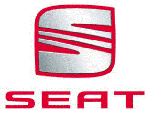 • Service to take 32,000 road trips per year off metropolitan network.
• Service to take 32,000 road trips per year off metropolitan network.
• Service to be provided by Cargometro, a joint company comprising Renfe, Comsa Rail Transport and Ferrocarrils de la Generalitat de Catalunya (FGC).
• Rail transport of parts fully operational by 2010.
Today the rail service for spare parts shipment between SEAT facilities at Martorell and the Zona Franca started up. The shipment capacity of approximately one million cubic metres of spare parts per year means that some 32,000 trips by heavy vehicles will be taken off the metropolitan road network. This new service is an addition to the already-existing rail transport system running between SEAT’s Martorell facility and the port of Barcelona, which was started up at the beginning of 2008 by the Catalan government’s Department of Territorial Policy and Public Works together with SEAT.
Spare parts transport will be managed by the rail operator, Cargometro. The distribution of stakeholdings in this newly-created company is 51% for Ferrocarriles de la Generalitat de Catalunya (FGC), 25% for Renfe Operadora, and 24% for the privately-owned railway company Comsa Rail Transport (CRT).
The service starts off at half-capacity pending the construction of new infrastructure both in Martorell and the Zona Franca, which will be ready early in 2010. In the meantime, one of the two train units envisaged can already run, once temporary access to the Zona Franca, contingent on work being done on Line 9 of the metro service, has been provided.
Service features
• Two diesel units, specially designed for this type of transport, each of which comprises two traction units and nine container-carrying carriages. These trains run in both directions, with a traction unit at each end, thus keeping manoeuvres and travel time to a minimum.
• Total train length is 205 metres.
• Each platform carriage carries two mobile-box type containers.
• When the service is fully operational, each train is scheduled to make three return trips a day.
• The trip length is approximately 40 kilometres and the complete outward and return journeys take eight hours (one trip in each direction, three loading and three unloading operations).
• A total volume of one million cubic metres of spare parts (some 2,800 cubic metres per day per workshop).
• For the transport of all material envisaged – when fully operational – each train unit will need to make 1,344 trips, representing 6 train trips per day for 224 days.
• The service will be provided uninterruptedly round the clock.
Sustainable mobility
The new service is a response to the increasing demand for a sustainable transport system for SEAT automobile spare parts between its facilities in the Zona Franca and Martorell, since it entails a substantial reduction – some 32,000 road trips less per year – in heavy vehicle traffic. It will also improve road safety as well as reduce the environmental impact of gas emissions.
If the effects of the other rail service transporting SEAT vehicles between its Martorell facility and the port of Barcelona are added those of the new service, then the total reduction in heavy vehicle road trips totals 57,000.
New infrastructure at facilities
The implementation project for this new specific service is possible thanks to the use of the currently-existing goods rail branch line belonging to Adif. The total distance covered is some 40 kms. The new service entails the construction of infrastructure to adapt the current tracks to new use. Certain work pending will be finalized next year – more specifically:
Inside the SEAT plant at Martorell, work to be done on extending the current track as well as the construction and covering of new unloading tracks, plus the building of a new shunting area.
At SEAT’s Zona Franca facility a temporary rail access track has already been built; adaptation and covering of the existing Adif tracks for goods loading and unloading is still pending.
Investment totalling 8.6 million euros
The infrastructure work which will take the rail service to 100% capacity entails a cost of 4.8 million euros; investment in rolling stock will run to a further 3.8 million euros, bringing the total amount to 8.6 million euros. The Department of Territorial Policy and Public Works (DPTOP), through the publicly-owned company FGC, has the task of implementing and financing the projects and the necessary infrastructure work, as well as acquiring specific rolling stock for the transport of automobile spare parts.
For its part, SEAT has taken on board the cost of the rail transport entrusted to Cargometro.
{mosloadposition user10}




